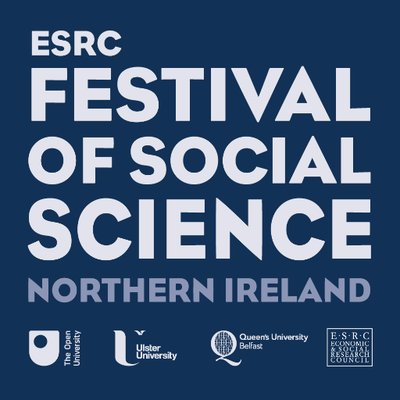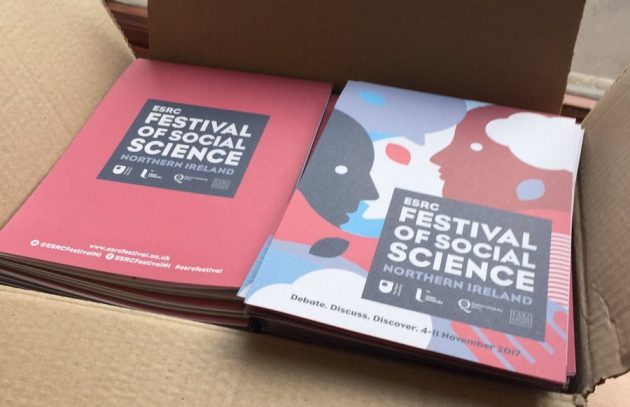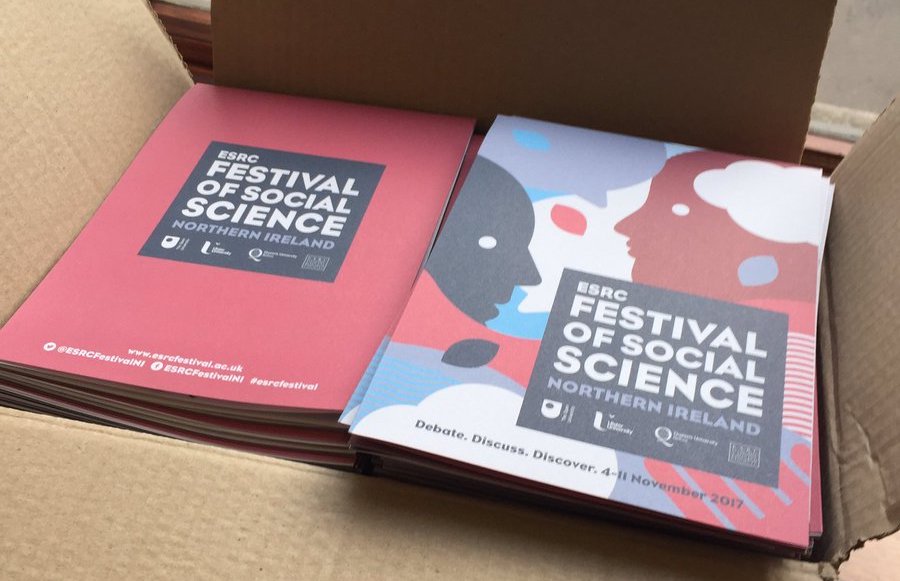Frances Morton is policy and public affairs senior manager at The Open University.
 The Economic and Social Research Council (ESRC) Festival of Social Science in Northern Ireland is back from 4-11 November.
The Economic and Social Research Council (ESRC) Festival of Social Science in Northern Ireland is back from 4-11 November.
Organised jointly by the three universities in Northern Ireland – The Open University, Queen’s University Belfast and Ulster University – this festival aims to open up leading research to new audiences, bringing social science into the public domain, and showing how the discipline influences our social, economic and political lives both now and in the future.
This year’s programme promises to be the biggest and most compelling yet with 31 free events taking place across 8 days in Belfast and Derry.
These will offer people the chance to debate, discuss and discover how social science shapes our lives: at work, in schools, when raising families and within our communities.
How can social science shape public policy, contribute to making the economy more competitive, and help us all better understand 21st century society?
There are talks and workshops and events to suit everyone. Some highlights in the packed week-long programme include:
Can they economy be Irish? With the looming threat of a hard border between the north and south of Ireland, Dr Leslie Budd and Dr Graham Brownlow will explore the contribution of agri-food to Ireland’s economy and culture. There will be live music! Wednesday 8 November, 6-7.15pm in The Sunflower.
Female ministry: Contexts and challenges. Throughout the history of the Christian Church, women’s ministerial roles have been controversial and contested. Malachi O’Doherty will chair a panel to discuss the historical background to women’s ministry, the challenges women in ministry in Ireland continue to face, and ways to encourage women’s ministry in the future. Thursday 9 November, 6-7.30pm in St Anne’s Cathedral.
Sport: the inequalities. Dr Teresa Willis will consider the role our identities, such as gender and sexuality, play in determining what sports (if any) we participate in. She will looks at the roles that the media, sporting organisations, and our own preconceptions can play. Friday 10 November, 6-7pm in The Sunflower.
Social backgrounds of Irish Volunteers: Derry city 1914-22. Take a hop back in time with Dr Adrian Grant from Ulster University to explore the fascinating social backgrounds of Irish Volunteers in Derry City from 1914 to 1922. Using interactive visual aids, such as census returns throughout that period and Google Maps, Dr Grant sheds new light on the social makeup of the Irish Republican movement during this time. Nearly a century later, what can we uncover about the people who made up the Irish Volunteers in Derry City? Friday 10 November, 6-7pm in The Playhouse, Derry.
The corporate capture of cities. Join us for a screening of The Opposition, which follows the grass-roots struggle to save Papua New Guinea’s iconic Paga Hill from international developers. Followed by a question and answer session, when Professor Kristian Lasslett from Ulster University will share forensic tricks of the trade that communities can use to challenge unwanted mega-projects. Saturday 11 November, 2-5pm in The Sunflower.
The Festival kicks off on Saturday 4 November with a special event by Professor Phil Scraton on his research into the Hillsborough disaster and a special screening of the documentary Hillsborough in the Queen’s Film Theatre.
 And throughout the festival a photo exhibition on The Aftermath of Migration on Kos is being hosted in Belfast Central Library. In the summer of 2015 the migration crisis hit the shores of the Greek island of Kos, with thousands of refugees given temporary accommodation in an abandoned hotel. This powerful photographic exhibition shows images of the hotel and the many and various objects left behind, and gives us a snapshot of life as a refugee, as well as the aftermath of the migration crisis. Just pop in to Belfast Central Library during normal opening hours.
And throughout the festival a photo exhibition on The Aftermath of Migration on Kos is being hosted in Belfast Central Library. In the summer of 2015 the migration crisis hit the shores of the Greek island of Kos, with thousands of refugees given temporary accommodation in an abandoned hotel. This powerful photographic exhibition shows images of the hotel and the many and various objects left behind, and gives us a snapshot of life as a refugee, as well as the aftermath of the migration crisis. Just pop in to Belfast Central Library during normal opening hours.
All events are free and are available to book online and you can share details of the events from the ESRC Festival NI Facebook page and find up-to-date information on Twitter. Look out for paper programmes in libraries, arts venues and university buildings too.
This is a guest slot to give a platform for new writers either as a one off, or a prelude to becoming part of the regular Slugger team.
Discover more from Slugger O'Toole
Subscribe to get the latest posts to your email.
